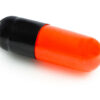What were the most popular stories in 2017? Our Top 10 runs the gamut from fighting allergies to learning more about senior safety when it comes to juggling multiple medications. Here are excerpts of the stories with the highest readership.
Browse This Article
1. 6 Medications That Can Harm the Kidneys
By Tori Rodriguez
 No matter what kind of medicine you take, whether OTC (over-the-counter) or prescription, it is destined to take a trip through your kidneys. Taking a drug the wrong way or in excessive amounts can damage these vital, bean-shaped organs and lead to serious complications. In the worst-case scenario, it could necessitate a kidney transplant.
No matter what kind of medicine you take, whether OTC (over-the-counter) or prescription, it is destined to take a trip through your kidneys. Taking a drug the wrong way or in excessive amounts can damage these vital, bean-shaped organs and lead to serious complications. In the worst-case scenario, it could necessitate a kidney transplant.
“Compared with 30 years ago, patients today… have a higher incidence of diabetes and cardiovascular disease, take multiple medications, and are exposed to more diagnostic and therapeutic procedures with the potential to harm kidney function,” according to Cynthia A. Naughton, PharmD, senior associate dean and associate professor in the department of pharmacy practice at North Dakota State University. All of these factors are associated with an elevated risk of kidney damage.
2. Probiotics: 5 Benefits, 3 Warnings and 4 Tips
By Madeline Vann
 Chances are, if you get a prescription for antibiotics, your physician has also recommended probiotic-rich yogurt or a probiotic supplement to reduce the risk of getting diarrhea. At the same time, you might be wondering whether you should follow the advice from friends, family and popular culture to take probiotics for everything from a healthier gut to a healthier brain.
Chances are, if you get a prescription for antibiotics, your physician has also recommended probiotic-rich yogurt or a probiotic supplement to reduce the risk of getting diarrhea. At the same time, you might be wondering whether you should follow the advice from friends, family and popular culture to take probiotics for everything from a healthier gut to a healthier brain.
“Probiotics are essentially additional bacteria that are either adding benefit or reestablishing benefit to what your body has,” explains Joshua Pullo, PharmD, clinical adjunct faculty member in the University of Florida College of Pharmacy in Gainesville and a practicing community pharmacist. Pullo says he answers questions about probiotics from his customers daily.
3. Proactiv Acne Treatment: Be Aware of Rare But Serious Side Effects
By Jedha Denning
 Skin does so much — it protects us from germs, ultraviolet radiation, viruses and infections. It repels water and contains our veins and muscles. It’s no wonder we often assume that products applied to the skin can’t hurt it. But some can.
Skin does so much — it protects us from germs, ultraviolet radiation, viruses and infections. It repels water and contains our veins and muscles. It’s no wonder we often assume that products applied to the skin can’t hurt it. But some can.
Unfortunately, skin care is one of those areas the FDA doesn’t tightly regulate, despite the fact that many skin care products contain ingredients that can be harmful to our health. While over-the-counter acne treatments list the more common side effects on their product labels, they fail to inform people of rare but very serious side effects that can occur.
4. Stuck With Statins? Try a Plant-Based Diet to Cut Back
By Madeline Vann
 The solution to a lifetime of statins could lie in a diet based on vegetables, whole grains, beans and fruit.
The solution to a lifetime of statins could lie in a diet based on vegetables, whole grains, beans and fruit.
The medical community recommends statins as a front-line (first-choice) treatment for high cholesterol levels that may also cut your chances of having a heart attack. Yet studies show that other cholesterol-lowering strategies, including dietary changes, reduce the risk of a cardiovascular event just as well as statins.
An additional benefit of eating better is that the practice doesn’t have the side effects statins do, which include an increased risk of developing diabetes and, in many people, muscle weakness and pain. Plus, a more wholesome diet will reap you other health benefits to boot.
5. Medications That Can Make You More Sensitive to Sun Damage
By Tori Rodriguez
 People often look forward to the warmer days of summer and the longer days of sunshine. But whether you’re catching some rays at the pool, beach or just your backyard, be careful. The increased exposure to the sun carries a risk that may be overlooked: Sun sensitivity due to certain medications.
People often look forward to the warmer days of summer and the longer days of sunshine. But whether you’re catching some rays at the pool, beach or just your backyard, be careful. The increased exposure to the sun carries a risk that may be overlooked: Sun sensitivity due to certain medications.
Technically called photosensitivity, the condition can result from the use of many different drugs, whether they are taken orally, topically or via injection.
6. Treating Neuropathy: Why Medications Are a Pain, and Some Alternatives for Relief
By Ronni Gordon
 Patricia Braden liked hiking for hours in the woods and walking her Corgi-mix dog near her home in Greensboro, NC. The retired clinical psychologist also enjoyed long conversations with friends, family, and her clients.
Patricia Braden liked hiking for hours in the woods and walking her Corgi-mix dog near her home in Greensboro, NC. The retired clinical psychologist also enjoyed long conversations with friends, family, and her clients.
But those days are over because of peripheral neuropathy and the side effects — such as problems with balance and concentration — of drugs used to treat it.
She is not alone. An estimated 20 million people in the US have some form of peripheral neuropathy, according to the National Institute of Neurological Disorders. The condition results from damage to the peripheral nervous system, the nerves running from the brain and spinal cord to the rest of the body.
7. What Actually Works in Fighting a Cold or Flu?
By Suzanne B. Robotti
 My mother had a strict rule when I was a child. If one of her 4 kids was sick enough to stay home from school, we got bed rest and no TV. Staring at the ceiling all morning was enough to get most of us back to school by lunchtime.
My mother had a strict rule when I was a child. If one of her 4 kids was sick enough to stay home from school, we got bed rest and no TV. Staring at the ceiling all morning was enough to get most of us back to school by lunchtime.
This is why I knew I was very sick last week. For the first time in several years, I had an upper respiratory infection — a nasty cold or maybe the flu. I spent most of a day and a half wandering vaguely from couch to bed, coughing spasmodically, feeling very dull. I didn’t even feel like turning on the TV.
By the third day, I’d finished up my cough lozenges that were sticky with old age and expired DayQuil (which upset my stomach and made me confused). I wanted relief from my cough and stuffy nose.
8. 3 Drug Classes That Send More Seniors to the ER
By Padma Nagappan
 This is part 1 of a 2-part series on drugs whose side effects send seniors to the emergency room. Part 2 is available.
This is part 1 of a 2-part series on drugs whose side effects send seniors to the emergency room. Part 2 is available.
There are more seniors living today than before, and they are also on more medications. But the number of visits they make to emergency departments of hospitals has increased much more than would be expected, and too many are arriving in the ER because of adverse reactions to drugs. Adverse drug reactions is doctor-speak for side effects of a medicine or 2 medicines that, when combined, can cause new side effects.
Blood thinners, diabetes medications and opioid painkillers are taken routinely by many seniors. These 3 classes of drugs were responsible for 60% of all ER visits that seniors made for adverse drug reactions. And seniors now represent 34% of all adverse reaction trips to the ER, compared to 2005-06 when they accounted for about 26% of such visits.
9. Calcium Supplements: Pros, Cons & Expert Tips
By Tori Rodriguez
 Everyone needs calcium, right? It seems many people are concerned about avoiding osteoporosis. No one wants to end up being painfully hunched over while using a cane or walker.
Everyone needs calcium, right? It seems many people are concerned about avoiding osteoporosis. No one wants to end up being painfully hunched over while using a cane or walker.
So should we all load up on calcium supplements? Not so fast. Too much calcium can crowd out other nutrients and cause kidney stones and constipation. Interactions with meds can be serious, and there’s a hint that calcium supplements may boost the risk for heart disease.
Though calcium is needed for various bodily functions to work well, it mainly helps to keep bones and teeth strong. “Calcium is crucial for optimal bone health throughout your life,” says Taz Bhatia, MD, an integrative health expert and founder of CentreSpring MD, an Atlanta medical practice. Without enough of the mineral, you may have a higher risk of bone fractures or osteoporosis, which become more common with age as bones become thinner. Calcium is helpful for increasing bone density in people with and without osteoporosis.
10. 4 Natural Ways to Fight Fall Allergies
By Tori Rodriguez
 Got itchy eyes and nose, sneezing fits and the sniffles? How could it be allergy season, again!?
Got itchy eyes and nose, sneezing fits and the sniffles? How could it be allergy season, again!?
While most people think of springtime when they think of seasonal allergies, fall can be another trying time. Allergic reactions caused by substances like dust mites, pollen or pet dander are technically called allergic rhinitis or hay fever. A reported 20 million adults and 6 million children had hay fever in 2015, according to the CDC (Centers for Disease Control and Prevention). A significant portion of those folks suffer from seasonal allergies due to pollen, most commonly from trees, grass, weeds and mold.
When exposed to these irritants, these sufferers experience symptoms like a stuffy or runny nose, sneezing, phlegm in the throat and itchy eyes. If this describes you, your first impulse might be to stock up on over-the-counter or prescription allergy meds like antihistamines, nasal steroid sprays and decongestants.
Before you do, though, try the tips below from Zhanxiang Wang, MD (China), PhD, LAc, assistant dean of the Acupuncture and Oriental Medicine program at the National University of Health Sciences in Lombard, IL.







